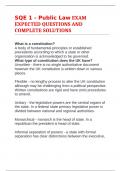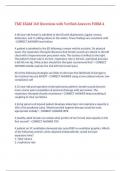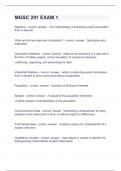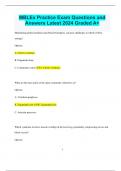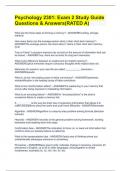EXPECTED QUESTIONS AND
COMPLETE SOLUTIONS
What is a constitution?
A body of fundamental principles or established
precedents according to which a state or other
organisation is acknowledged to be governed.
What type of constitution does the UK have?
Unwritten - there is no single authoritative document
however the UK constitution is written down in various
places.
Flexible - no lengthy process to alter the UK constitution
although may be challenging from a political perspective.
Written constitutions are rigid and have strict procedures
to amend.
Unitary - the legislative powers are the central organs of
the state. In a federal state primary legislative power is
divided between national and regional authorities.
Monarchical - monarch is the head of state. In a
republican the president is head of state.
Informal separation of powers - a state with formal
separation has clear distinctions between the executive,
,legislative and judiciary. There is a high degree of overlap
of personnel in the UK
Name the three core principles of the UK constitution
1. the Rule of Law
2. Parliamentary Supremacy
3. Separation of Powers
Name the four principle sources of the UK constitution
1. Statute (acts of parliament)
2. Case law
3. the royal prerogative
4. constitutional conventions
Describe some key acts of parliament that make up
the UK constitution
The Magna Carta 1215 - first time powers of the monarch
were limited
Bill of Rights 1689 - Removed power of Monarch to
suspend acts of parliament
Acts of Union 1706 -7 - united England and Scotland
under single Parliament
Parliament Acts 1911 and 1949 - altered relationship
between Lords and Commons
PACE 1984 - deals with civil liberties
Human Rights Act 1998 - incorporate ECHR into domestic
law.
,Acts of devolution - devolved power to wales NI and
Scotland
Constitutional Reform Act 2005 - removed lord chancellor
as head of judiciary and created Supreme Court
EU Withdrawal Act 2018 and EU withdrawal act 2020 -
dealt with withdrawal and supremacy of EU law.
How does primary legislation interact with judicial
decisions?
The government can introduce any primary legislation
including legislation which will effectively overturn
judgements of the court. This can also operate
retrospectivly.
Describe some key examples of case law which make
up the UK constitution
Residual freedom
Actions of the state must have legal authority
Legal disputes should be resolved by the judiciary
Habeas corpus and individual liberty
Right to a fair hearing
What is the royal prerogative?
Residue of discretionary / arbitrary authority which at any
given time is legally left in the hands of the Crown
Every act the executive can do without authority of an Act
is done by prerogative.
, Derive from common law and exercised by or in the name
of the Monarch (often by the Government on the
Monarch's behalf).
Give some examples of prerogative powers
Foreign affairs
- declarations of war
- making treaties
- recognising foreign states
Domestic affairs
- summoning parliament
appointment and dismissal of PM
- giving of Royal Assent to bills
- defence of the realm
- granting public honours
- setting up of public bodies to disburse funds made
available by Parliament
Where there is conflict between Statute and the Royal
Prerogative, which prevails?
Statute.
How does the royal prerogative interact with statute?
Acts of parliament can remove prerogative powers but not
add to them.
Define constitutional conventions
Non-legal source of the constitution recognised but not
enforced by the courts.
Rules of constitutional behaviour which are considered to
be binding on those who operate the constitution which
are not enforced by the courts.

